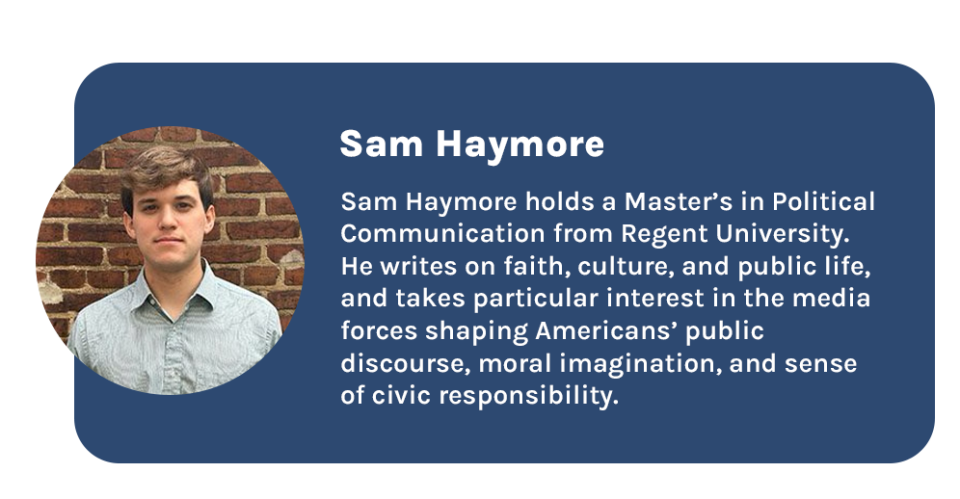Against the Grift: A Christian Response to Transactional Work Culture
If you’ve spent any amount of time following online political commentary in the last few years, you’ve likely come across the following phrase: “Respect the grift.” The phrase, best read as a sarcastic quip, most often expresses one’s disapproval of the content that a certain class of social media commentators and activists, known as “grifters,” create. Grifter content garners such criticism by engaging with political and sociocultural topics in ways that are insincere and designed to boost audience engagement by being outrageous.
You see, because the grifters aim to profit from social discord and an infamous online persona, they do not care so much about being truthful or conscientious when discussing issues of national importance. Instead, their only concern is self-promotion, which calls for algorithmic exploitation, not communicative responsibility.
God’s Vision for Work
Grifting is worthy of your attention, not only because of what it says about the sorry state of our national dialogue, but also because it speaks to a common way our culture encourages us to distort the biblical vision for work. Genesis 1:27-30 lays out this vision, calling humans to exercise responsible “dominion” over the earth, to draw out the creation’s potential for goodness and human flourishing through our labor. Tim Keller’s Every Good Endeavor expounds upon this vision, explaining how work at its most fundamental level is about “bringing order out of chaos, creatively building a civilization out of the material of physical and human nature, caring for all that God has made.”
Put simply, biblical work is socially and theologically oriented. It is driven by a love for our God, his creation, and our neighbors. And it always results in the laborer contributing to the common good.
How Grifting Distorts That Vision
Grifting falls short of this ideal in that it embodies a reductive vision of work, one that does not consider these social or theological dimensions. In this vision, work is an economic action performed purely out of self-interest. It is nothing more than a transaction, a supply that meets a demand. It does not require you to love your neighbor or produce social goods of any real value. So long as what you are doing is profitable and perhaps legal, it is an appropriate form of work.
With this vision orienting them, grifters can feel perfectly justified in pumping out content with large doses of fearmongering and ragebaiting sprinkled into the mix. No matter that the end product is polarizing the public and fomenting conspiratorial thinking. If commodified chaos is what the people want to buy after all, why not sell it to them?
Our culture really does expect us to respect the grift, even if we can’t always stomach it.
This line of reasoning may feel eerily familiar to you, and it probably should. The truth is that our society contains no shortage of individuals and industries that operate out of a similar transactional understanding of work. Sports betting companies, for example, have no problem with selling services that cultivate addictive and socially disruptive behaviors because there happens to be a massive market for this kind of “entertainment.” Strip clubs and porn sites can justify selling human sexuality along similar lines, all while passing it off as “sex work.” Who is to say that these kinds of commercial activity are illegitimate if work truly is about acting in your own self-interest? Is everyone not entitled to chase the American dream in the best way they know how?
The irony should not be lost on you here. Our culture really does expect us to respect the grift, even if we can’t always stomach it.
Rejecting the Grift Mindset
In our own lives, we may not be poisoning the national dialogue or engaging in morally reprehensible industries when we fall prey to this grift mindset. But we should recognize how seeing our work as just a source of income can tempt us to cut corners, to hide mistakes, and to cheat coworkers and clients alike so long as we can get away with it. These behaviors, though they may seem harmless in the moment, all contribute to social dysfunction. They violate our responsibility to steward the created order, to love our neighbor, and to better our society through our work in the way that God intends.
Standing against the grift mindset requires followers of Christ to eschew transactionalism in favor of the biblical vision for work. This does not mean that we should dismiss the profits that come with doing excellent work as unimportant or immoral. They are also a blessing and a kind of social good, of course. But it does mean, to quote Keller, that we should always “connect our work to God’s work,” laboring in love for the world he created and the society he expects us to cultivate.


